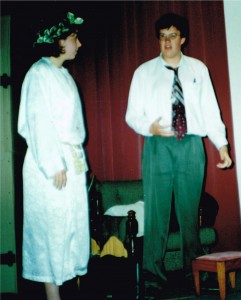 September means “back to school” for most North Americans. While moms are buying school supplies, you may be quietly, and desperately, searching for a Christmas program to fit your church. The prospects may be discouraging. Maybe your church is too small to do a cantata and many Sunday School programs demand more than your church can provide. Christmas may be a major evangelistic outreach for you. You want something nice, but you are discouraged with your limited resources. What can you do?
September means “back to school” for most North Americans. While moms are buying school supplies, you may be quietly, and desperately, searching for a Christmas program to fit your church. The prospects may be discouraging. Maybe your church is too small to do a cantata and many Sunday School programs demand more than your church can provide. Christmas may be a major evangelistic outreach for you. You want something nice, but you are discouraged with your limited resources. What can you do?
4 Things to Consider When Choosing a Christmas Program
1. What is my purpose for the program?
Often Christmas programs are mainly evangelistic. It is the one time in the year to reach the families of kids who come to church. If that’s true for you, you want to be sure to feature these kids, not just your core church kids. Parents come to see their kids perform. Showcasing their kids is more important than showcasing more talented performers.
2. What do I have to work with?
How many people will participate? What ages are they? How willing are they to work? Are they musicians or are they more inclined toward drama? Consider how you can use the people you have in a way that will make them feel good about their participation.
3. How can I make the message meaningful for the audience, yet fun?
You may have people attend your program who only rarely attend church. You want this experience to be a positive one. If the overall tone is heavy and preachy it may push them further away. You certainly want a strong salvation message clearly presented, but lighter moments may help your unsaved audience better receive the message. Look for a Christmas program which will keep the atmosphere friendly and positive.
4. How can I make the program meaningful for the performers?
Program practice needs to be well organized, moving through the practices in an efficient manner. Some sense of discipline is necessary, but the general atmosphere should be upbeat. You want to emphasize that the purpose of your performance is God’s glory, not to show off. Yet the whole experience should be fun and fulfilling.
You may choose a program that your church is capable of producing through hard work, but you also need to consider how willing your people are. If your kids, performers, and workers are not highly motivated, you are probably better off not choosing a very difficult program. If you are going to have to threaten your performers and workers and drive them mercilessly to memorize lines and attend long practices, you’ve probably chosen the wrong program. On the other hand, a few highly motivated people can form the core of a more difficult program, with less motivated people playing less demanding parts.
I offer eight Christmas programs which I have used in a small mission church. Some are more demanding than others. “No Room for Jesus” is my personal favorite. Most are free, but some you have to order. Happy planning!

